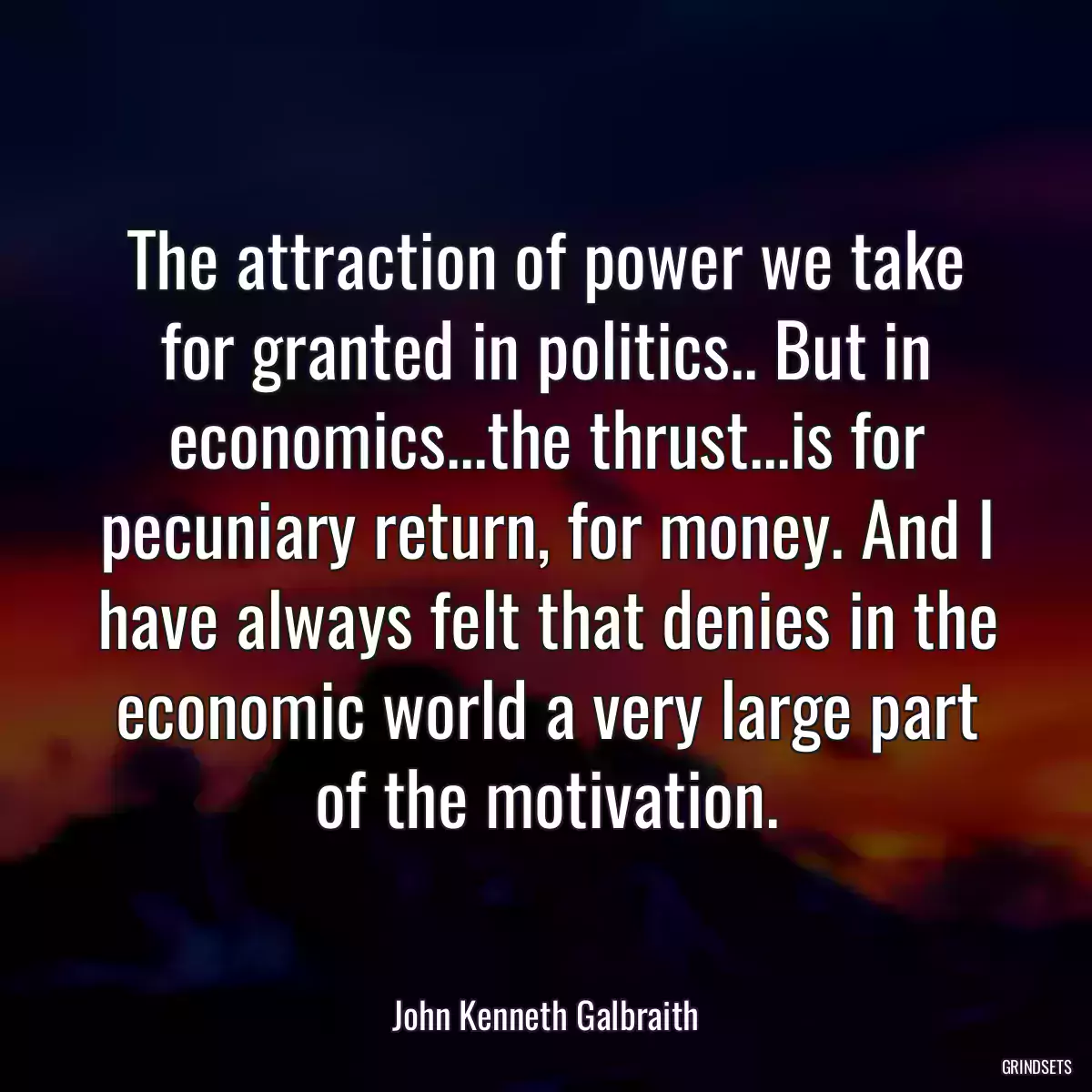
Quotes John Kenneth Galbraith
Find dozens of John Kenneth Galbraith with images to copy and share.

The seminar in economic theory conducted by Hayek at the L.S.E. in the 1930s was attended, it came to seem, by all of the economists of my generation - Nicky Kaldor , Thomas Balogh, L. K. Jah, Paul Rosenstein-Rodan, the list could be indefinitely extended. The urge to participate (and correct Hayek) was ruthlessly competitive.
The spirit should never grow old.
We can safely abandon the doctrine of the eighties, namely that the rich were not working because they had too little money, the poor because they had much.
You may also like
The notion of a formal structure of command must be abandoned. It is more useful to think of the mature corporation as a series of concentric circles.
When people put their ballots in the boxes, they are, by that act, inoculated against the feeling that the government is not theirs. They then accept, in some measure, that its errors are their errors, its aberrations their aberrations, that any revolt will be against them. It's a remarkably shrewd and rather conservative arrangement when one thinks of it.
It had been held that the economic system, any capitalist system, found its equilibrium at full employment. Left to itself, it was thus that it came to rest. Idle men and idle plant were an aberration, a wholly temporary failing. Keynes showed that the modern economy could as well find its equilibrium with continuing, serious unemployment. Its perfectly normal tendency was to what economists have since come to call an underemployment equilibrium.
The urge to consume is fathered by the value system which emphasizes the ability of the society to produce.
The oldest problem in economic education is how to exclude the incompetent. A certain glib mastery of verbiage-the ability to speak portentously and sententiously about the relation of money supply to the price level-is easy for the unlearned and may even be aided by a mildly enfeebled intellect. The requirement that there be ability to master difficult models, including ones for which mathematical competence is required, is a highly useful screening device.

Good writing, and this is especially important in a subject such as economics, must also involve the reader in the matter at hand. It is not enough to explain. The images that are in the mind of the writer must be made to reappear in the mind of the reader, and it is the absence of this ability that causes much economic writing to be condemned, quite properly, as abstract.
A nuclear war does not defend a country and it does not defend a system. I've put it the same way many times; not even the most accomplished ideologue will be able to tell the difference between the ashes of capitalism and the ashes of communism.
Inventions that are not made, like babies that are not born, are rarely missed. In the absence of new developments, old ones may seem very impressive for quite a long while.
Nothing so denies a person liberty as the total absence of money.
Monetary policy suffers from the unfortunate absence of any occult effect. It has long been clear that economic management...would be greatly facilitated if resort could occasionally be had to witchcraft.
There is certainly no absolute standard of beauty. That precisely is what makes its pursuit so interesting.
Wisdom... is often an abstraction associated not with fact or reality but with the man who asserts it and the manner of its assertion.
Much literary criticism comes from people for whom extreme specialization is a cover either for grave cerebral inadequacy or terminal laziness, the latter being a much-cherished aspect of academic freedom.
You may also like

Complexity and obscurity have professional value - they are the academic equivalents of apprenticeship rules in the building trades. They exclude the outsiders, keep down the competition, preserve the image of a privileged or priestly class. The man who makes things clear is a scab. He is criticized less for his clarity than for his treachery.
When people are least sure, they are often most dogmatic.